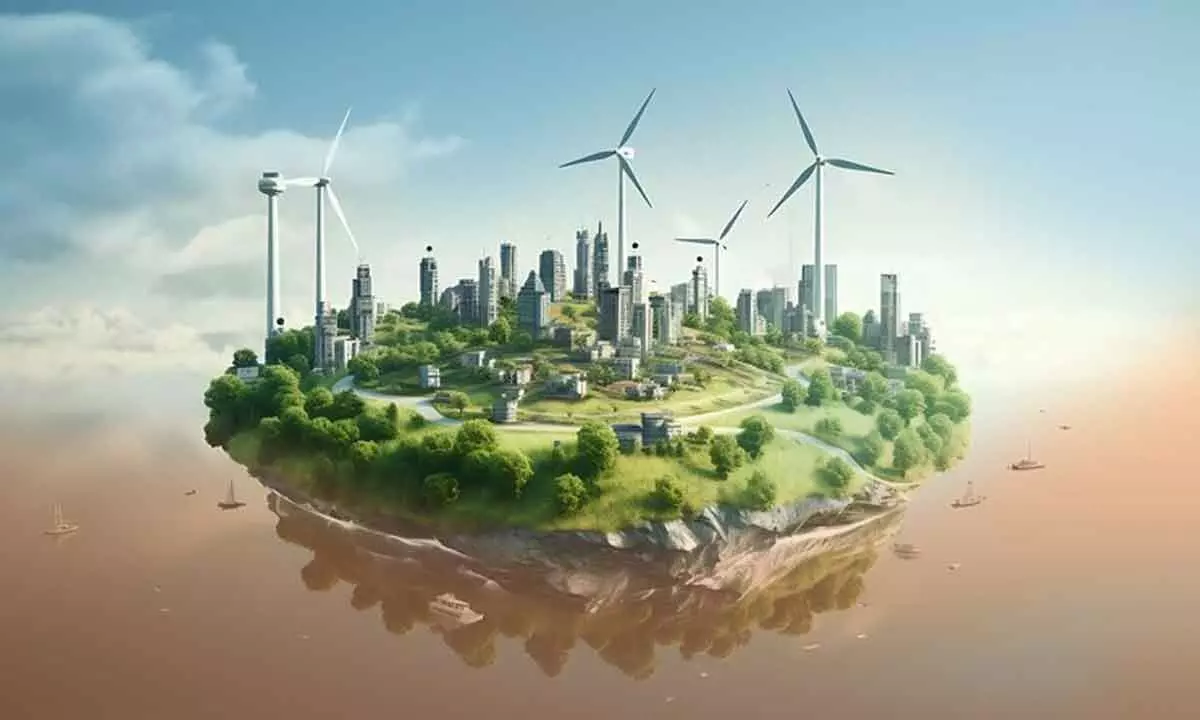Live
- Poonch terror attack: Security forces release sketches of two terrorists
- Constituency Watch: For BJP it’s fight for consolidation while Congress sees an opportunity to regain past glory in Nandurbar
- Congress, BRS, AIMIM following Muslim League agenda: J P Nadda
- PeopleStrong, Google Cloud join hands to transform employee experience with AI
- Siguler Guff invest Rs 240 crore in Hyderabad-based microfinance lender Spandana Sphoorty
- 'BJP CM will take oath in Odisha on June 10', roars PM Modi at Berhampur rally
- Five-year-old boy found dead after being swept away in Texas floodwaters
- Akhilesh appoints Shyam Lal Pal as new state president of SP
- Manipur: Educational institutions close for two days after heavy rains, hailstorm
- End of BJD rule on June 4, says Modi
Just In
A historic commitment to zero-carbon energy system


For “A world that is safer and more secure, more prosperous, and more free,” in the words of the then US President Barack Obama, in December 2015,...
For “A world that is safer and more secure, more prosperous, and more free,” in the words of the then US President Barack Obama, in December 2015, nearly 200 countries signed what has come to be known as Paris Climate Agreement, to check the climate change. The Paris summit vowed the resolve of every nation to substantially cut down on reduce global greenhouse gas emissions in an effort to limit rise in global warming to 2 degrees Celsius above preindustrial levels, while pursuing the means to limit the increase to 1.5 degrees. However, plunging the world in shock, the next US President Donald Trump pulled the US out of the pact in November 2020. Fortunately for the world, Joe Biden, who succeeded Trump, undid the damage and the US signed the agreement in February 2021. After a series of negotiations, in the Italian city of Turin, the Group of Seven (G7) developed nations - Canada, France, Germany, Italy, Japan, the UK and the US - announced on April 30 that they would sign a deal to end the use of coal in power generation between 2030 and 2035. They will pledge to shut down coal-fired plants in the first half of the 2030s.
When burned, fossil fuels emit greenhouse gases like carbon dioxide and nitrous oxide into the atmosphere, which trap heat and increase the Earth’s average air temperature. In 2018, 89% of global CO2 emissions came from fossil fuels and industry, with coal responsible for over 0.3C of the 1C increase in global average temperatures. Carbon emissions trap heat in the atmosphere and lead to climate change which has been occurring at alarming level for over a decade. In recent years, the world has witnessed most devastating effects: extreme droughts, wildfires, floods, tropical storms, and other disasters that we refer to collectively as climate change. 2023 turned out the warmest year on record since global records began in 1850.
Fossil fuel is basically a naturally occuring fuel such as coal or gas, and coal is the most polluting fossil fuel. It has been established that coal-fired power plants contribute around 75% of the global power sector’s carbon dioxide emissions, which account for about 25% of total global greenhouse gas emissions.
The G7 pact on a time-bound action plan for the coal phase-out is certainly a historic success for climate protection. It would provide a framework for other countries to expedite climate mitigation processes.
However, there is a disquieting news from Turin. The G7 action is not going to be uniform in that there is a caveat on room for manoeuvre to Berlin and Tokyo, whose coal-fired plants produce more than one-fourth of their total electricity. India, a major coal user, has vowed it will continue to rely on coal power until it becomes developed country. With G7 not fulfilling their promise to provide $100 billion a year in funding for developing countries to adapt to climate change, it is skeptical of the move or any call for it to phase out coal production. Many nations toe India’s line. Hence, the rich nations have to double down on their green efforts to help the world make a coal-to-clean fuel transition. Growing economic recession in developed nations, too, is the major stumbling block. Nevertheless, stamping an end date on the coal era signals the commitment of the wealthiest countries towards a creating a green future for the globe. It is now imperative that the world meets its prior commitment to tripling renewable energy, and setting up resilient electrical grids.

© 2024 Hyderabad Media House Limited/The Hans India. All rights reserved. Powered by hocalwire.com






